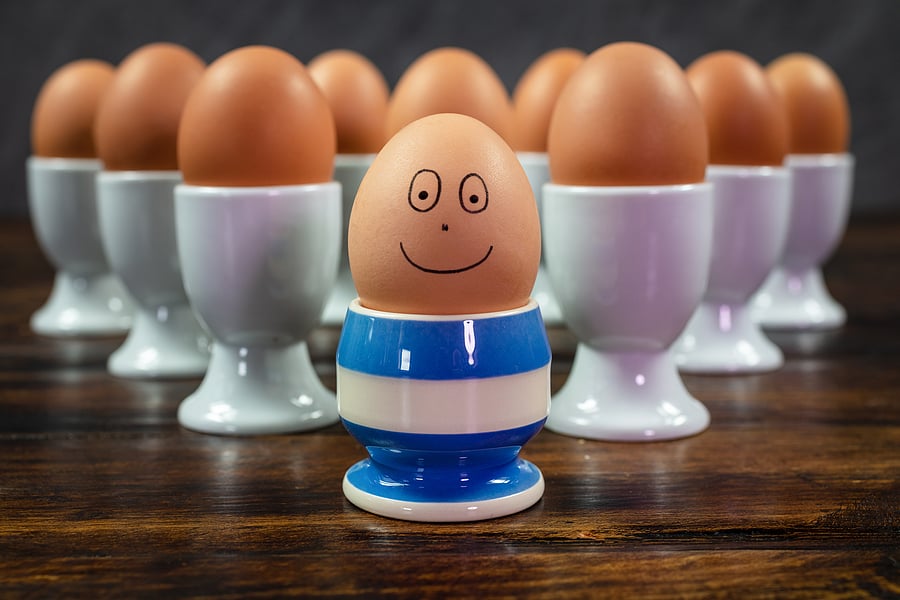Going to Work on an Egg!
The British Egg Marketing Board launched a campaign during the 50s and 60s promoting the benefits of eating eggs but are eggs really good for us?
Eating eggs went out of favour for a while with concerns around the amount of cholesterol they contained but today, just as in the 50s and 60s, it is generally believed that eggs can make a valuable contribution to daily nutrient requirements.
Here we investigate how beneficial eggs can be but first take a look back at one of a series of television adverts ‘Go to work on an egg’ starring Tony Hancock and Patricia Hayes:
Are eggs really good for us?
There are plenty of benefits to eating eggs every day.
Eggs are loaded with nutrients, some of which are hard to come by from other food sources. The white of the egg provides most of the high-quality protein while the egg yolk contains vitamins, minerals, antioxidants and healthy fats.
Here are some more great reasons for eating eggs:
Eggs are nutrient rich
Packed full of vitamins and minerals. Eggs contain:
• Protein
• Vitamin D
• Vitamin A
• Vitamin B2
• Vitamin B12
• Folate
• Iodine
Eggs contain high quality protein
Other foods may contain proportionately more protein than eggs but it’s the quality of the protein found in eggs that really excels.
Proteins in the body strengthen, build and repair and a single egg contains around 6.3 grams, providing us with the nine essential amino acids perfect for keeping our bodies working efficiently.
Eggs are low in saturated fat and a good source of Omega 3
Along with prawns, eggs are the only food high in cholesterol that are low in saturated fat.
While the cholesterol in eggs is much higher than in meat and other animal products, it is saturated fat that increases blood cholesterol.
Eggs contain similar types of omega 3 as those found in oily fish. Omega 3 has many health benefits but in particular it is good for our heart and brain health.
Eggs can help in maintaining a healthy weight
Eating eggs can make you feel full for longer so having eggs for breakfast may reduce calorie intake later in the day and even promote fat loss.
Studies have found that eggs can help reduce variations in glucose levels, they delay the rate at which food leaves the stomach and so leave you feeling satisfied and less inclined to feel that mid-afternoon slump.
Eggs are good for the eyes, especially as we age
Rich in antioxidants, eating eggs may help reduce the risk of certain eye diseases as we age.
The yolk of an egg contains vitamin A, lutein, zeaxanthin and zinc.
These antioxidants are all vital to eye health and may help to reduce the onset of cataracts, macular degeneration and even help to protect the eyes from retina damage.
How many eggs should we eat?
The NHS has no recommended limit on how many eggs people should eat but it is best to eat eggs in a healthy way. For example, cooking without adding salt or fat.
Enjoy eggs:
- Boiled or poached, without added salt
- Scrambled without butter and using low-fat milk instead of cream
Frying eggs can increase fat content by around 50%.
And finally…
Eggs are among the most nutritious foods you can find, providing virtually all the vitamins and minerals you need.
They are also cheap, tasty and versatile. Eggs are indeed an exceptional superfood!
Disclaimer
All content on Silversurfers.com is provided for general information only, and should not be treated at all as a substitute for the medical advice of your own doctor or any other health care professional. Silversurfers will not be responsible or liable for any diagnosis made by a user based on the content on www.silversurfers.com and we are also not liable for the content of any external websites or links from or to Silversurfers to any other websites. Please always consult your own doctor if you’re in any way concerned about any aspect of your health
Melina - Assistant Editor
Latest posts by Melina - Assistant Editor (see all)
- Remembering the Big Freeze of 1963 - November 21, 2024
- Is your hot water bottle safe to use? Tips on what to look out for - November 20, 2024
- Tips on dealing with a frozen windscreen without using a spray de-icer - November 19, 2024
- 5 Homemade edible gifts in a jar - November 15, 2024
- The best of the Rolling Stones - October 22, 2024





















